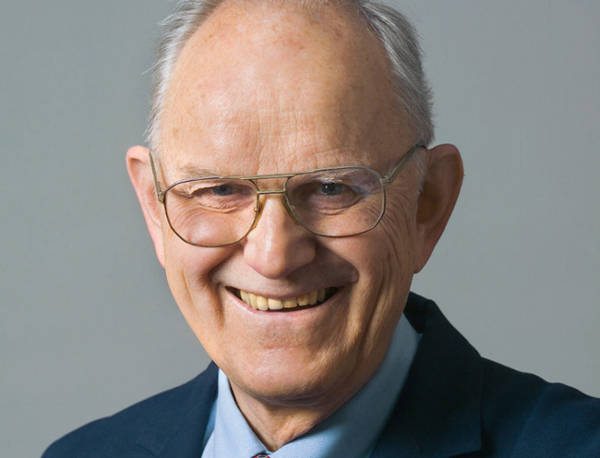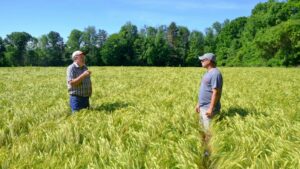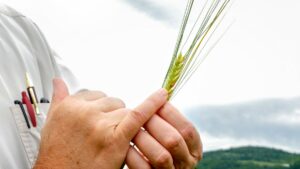William Pardee, a seed expert who led plant breeding efforts at Cornell University during the pivotal era when biotechnology transformed the field, died May 1 in Ithaca. He was 86.
Born July 7, 1929, Pardee developed his interest in agriculture while working on his family’s farm in Orange, Connecticut. He received a botany degree from Dartmouth College in 1951 and his doctorate in plant breeding from Cornell in 1960. Six years later he joined the Cornell faculty, becoming a leader in seed development used in New York agriculture.
Pardee excelled as an advocate for crop improvement who was able to connect with researchers in academia as easily as stakeholders and farmers across the state.
“Bill knew every person in New York who was important to the seed industry,” said Ronnie Coffman, international professor of plant breeding and director of International Programs in the College of Agriculture and Life Sciences. “He was the consummate extension person, a person who never met a stranger when it came to New York agriculture.”
From 1969 to 1981, Pardee was active in the Association of Official Seed Certifying Agencies, an international organization dedicated to the production, identification, distribution and promotion of certified seed. At Cornell he was instrumental in the Foundation and Certified Seed Programs that merged into the New York Seed Improvement Project in 1991.
As a young scientist, Pardee became established during a time when plant breeders focused on field and greenhouse trials and few extended their research into laboratory settings. As Pardee wrote in a centennial history of Cornell’s plant breeding program, “Our emphasis was focused on breeding improved varieties and enhanced germplasm. We were good at it, and the model worked well.”
But that model went through a distinct transformation during the years Pardee chaired the Department of Plant Breeding and Biometry, 1979-89. A surge of advances in biochemistry and molecular genetics during that era reshaped plant breeding as scientists developed sophisticated tools and understanding to probe the genetic underpinnings of crop plants.
Anticipating how technology would change plant breeding, Pardee pushed for the recruitment of young scientists with backgrounds in genetics who could exploit and further develop this shift in techniques. He proposed the creation of a new faculty position to bridge the plant breeding program with new concepts in biotechnologies.
That effort led to the hiring of Steve Tanksley, the Liberty Hyde Bailey Professor Emeritus, who during the 1980s created the first chromosomal maps of plants and pioneering genetic techniquesessential to modern crop development.
The interest in biotechnology in the 1980s came at the same time as state funding diminished in traditional breeding programs. As chair, Pardee established tighter relationships with grower and industry groups to fund program research as government backing waned. He helped spur renewed funding for seed projects that were in precarious funding position, including research on alfalfa and dry beans.
As Pardee recalled of his time as chair in the centennial history: “It was a busy and challenging time, and I enjoyed nearly all of it … I believe we advanced the science of plant breeding. And I know that we contributed a series of improved varieties, inbreds and breeding lines that made important contributions to seed companies, seed growers, farmers, gardeners and consumers.”
He is survived by his wife, Barbara Klaer Pardee, and four children. A memorial service is planned for June 18 at 3 p.m. at Kendal at Ithaca. Memorial donations can be made to the Kendal Rainy Day Fund or the Ithaca Unitarian Church.













